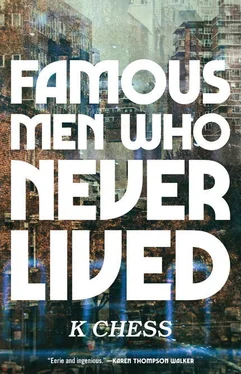Vikram threw the cigarette stub out the window. “Leave it alone. OK?”
“I can’t. What dam, Viki? Find me the dam that did it.”
He grabbed her right hand and kissed it, tracing with his lips the mysterious scars that crossed all four of her fingers. “I don’t know what dam. I made the dam up.”
“There is no dam. There’s just Sleight. His death.”
Every UDP agreed that something had gone wrong. Only she had it narrowed down to a day, a minute. A singular event, dividing Before from After. Her fascination and her talk about another world worried Vikram. Next thing he knew, she’d take out those Tarot cards he’d bought her in the Village as a joke.
How torn Hel always seemed, between the rational and the mystical. He sank back down on the bed. “There are plenty of causes more likely than some science fiction writer falling out of a rowboat as a kid.”
“ Some science fiction writer? Really? That’s all he is to you?”
What was he supposed to say? “I never knew him, Hel. You never knew him either. He’s not even real anymore.”
It all ended in a rush nearly three years ago now, when the first lots of lucky people moved through the hole into this world. Groups of one hundred at a time—men, women, but no children—stepping dazed into the spaces between the grave markers of Calvary Cemetery in Queens. There were ten entry groups per lot, lots coming at precise hourly intervals, the hole closing up behind them each time like a wound healing in time lapse. Emergency crews had their hands full, moving the newest arrivals out of the way to make room for more. All of the newcomers told the same story—coordinated teams of domestic terrorists, young men radicalized by pro–America Unida messages hidden in visor games from the south. The power plants in Poughkeepsie and Richmond and Escondido simultaneously sabotaged, all timed to the minute, and the sulfur-yellow radiation clouds blowing with the prevailing winds. Then retaliatory strikes across the Caribbean, backup from allies. Old promises called in and standoff agreements abandoned.
And that miraculous escape hatch, shining in the air above Calvary. Their Calvary—the one that corresponded. All these people, the gathering crowd of onlookers realized, were New Yorkers, too.
Finally, another hour passed and a 157th lot did not come through—it just never showed up. An unexplained end to the exodus. Of course, that spurred further media coverage and more speculation about what might have happened on the other end to halt the evacuation.
At first, public curiosity had been intense, the attention not unfriendly. The scientifically inclined and the religious were equally fascinated by this miraculous proof of the existence of a version of creation other than the one they knew. Multiple universes seemed likely, each one fully formed and somehow held apart from the others until now. It made great copy. It took a while to dawn on the amazed people of this New York that they had 156,000 new citizens to feed, house, and somehow integrate. Individuals diverse in their needs but all propertyless and homesick, some of them elderly or disabled, some trained only to do specialized jobs that did not exist here, many suffering from PTSD or immobilized by grief.
The newcomers, whose reality had betrayed them. Here they all were, crash-landed. Resented and resentful. Universally Displaced Persons.
Meanwhile, everyone who hadn’t gotten through the Gate had died. That was a given. The Gate was a prototype. One of a kind. One-way.
The logbook didn’t mention anything unusual, so Vikram left the guard shack for his first tour of the perimeter in good time, by 23:15. He liked working late tours, knowing that the self-storage warehouse would be quiet for hours. The last person he’d talked to was Kabir, in such a hurry to leave for a date that they’d barely exchanged two words, and Vikram, if all went as expected, wouldn’t see another living soul until 06:00 or so, when the front desk worker arrived for the early shift. Sometimes, adventurous teenagers snuck into the parking lot behind the building in search of a wall to tag or a dark corner to hide a tryst. Sometimes he found a homeless person huddled by the fence like wind-sent trash. But most nights he spent entirely alone.
He took the keycard-operated elevator up to the top floor of the old mattress factory. Some entrepreneur had gutted and retrofitted the whole building back in the ’90s, converting it from three stories to five. During the retrofit, most of the old windows had been sealed up; only the ones in the hallways remained uncovered. They no longer corresponded properly with the stories of the building; on some floors, hazy illumination from the parking lot came in near the ceiling, but on five, half windows disappeared into the floor.
Vikram made his way down the narrow corridors between the rows of locked doors, pointing his light into every corner. He walked in a winding pattern that took him past each unit on his way to the fire stairs, then pushed through the heavy doors and walked down a flight, where he swiped his card to access the next floor. On four, he followed the same pattern. The beam revealed nothing but the narrow corridor, the faceless doors of the units, the sprinkler heads up above and smooth cement floor below. He found the routine comforting; the pleasant indistinct scuffing of the rubber soles of his own shoes on the cement and the intense prickle of watchfulness he felt on each new level when he pushed open the door from the stairs. Would someone be there waiting?
He’d held this same menial job since the early months of his displacement. The only real duties were the rounds, but video monitoring of the guard shack made it impossible to read a book or sleep without getting written up. Kabir had warned him of this. Kabir, a fifty-five-year-old Pakistani, had been standoffish during the half-hour overlaps of their shifts at first, rushing off to the bathroom to wash his hands at any accidental touch, as if Vikram were the carrier of some unquarantinable disease, but as the silent weeks wore on, the older man’s natural pedantry won out and he began to spend their overlap time instructing Vikram, delivering heavily accented lectures on such diverse topics as John Grisham, Cher, The Fresh Prince of Bel-Air , and the Brooklyn Nets. Kabir had explained the concept of online poker and what an “ass-load” was. The information he provided was far more essential to Vikram’s education than anything he ever learned in his Reintegration Education group. In return, Vikram confided in Kabir about his loneliness. Fat Kabir, with his bad teeth and bad advice, rocking in his wheeled desk chair. Vikram felt sheepish about how much he’d revealed, back in that period of his life. He looked at it now as his adjustment period—a time when he believed he was too good for this work. Vikram had complained until there was nothing left to say, sharing far too many of his disappointments. He preferred the loneliness of the storage company after Kabir was gone.
The layout of the first floor of the old factory differed from the floors above because of the placement of the centrally located reception/security desk, and because of the larger, more expensive units. Vikram peered into the cage that enclosed the vacant desk, sweeping his light across the blank-faced monitors, the row of hooks on the back wall, the dangling keys as yet unassigned. Then he checked both first-floor hallways, holding his breath as he turned the corners. His radio hung from his belt, tugging at the waistband of his trousers, and his big flashlight was solid in his hand.
Читать дальше













